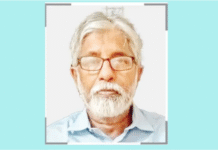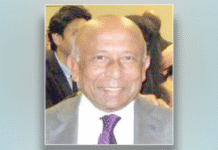Shahid Islam
Following years of bashing, bullying and being on the run, the Islamists of Bangladesh are seemingly regrouping to face politics with bold outlook and benevolent intent. In social media, many new-generation-Islamists are looking for heroes to inspire and guide them as the BNP faces more pressure to pluck off the long standing Jamaat-I-Islami (JI) from its rank..
Certainly the terror attacks in Gulshan and Sholakia had acted as the catalyst to such a new visionary galloping and political adventurism within the young Islamists. There is also a desire among the domestic Islamists to disentangle from the international terror nexuses which had primed some of their actions in recent years.
New outlook
Whether they’d acted as an affiliate of the IS or the al-Qaeda, the religious zealots involved in an orgy of killings since 2013 is learnt to have agreed to organize the new Islamic party to vie for power and turn Bangladesh into an Islamic nation, the Holiday had learnt. The arrangement for the launching of this new Islamic party is in its final stage, confirmed a source, insisting on anonymity. “It was thought of and its manifesto drawn out of the country,” said the source. Many young JI followers have already gathered under its emerging shadow, which one of the organizers termed as the ‘new voice of the young Bangladeshi Muslims.’
Lately, the proposed party officials have collected donations from expatriates in the UK, France, Germany, USA, Canada and Australia, it was learnt.
The Holiday had learnt of another major development: According to a reliable source, the government of Sheikh Hasina had managed to buttonhole into the terror cobweb to propose a deal with the jihadists that “no more jihadis will be killed by law enforcers in return for their promise to cease terror operations and getting back to normal life.”
Information gathered from media reports and some reliable sources within the law enforcers revealed there are at least 4,000 jihadists of various hues holed up inside Bangladesh, many of whom had traveled to Syria and Iraq for the IS training and indoctrination. The source said, “former North-South university teacher Hasnat Karim is one of the leaders of the group, known to be aligned with the JMB internally, and with the IS externally,” adding, “former army Major Ziaul Hassan is the military commander of the Ansarullah Bangla Team (ABT), which is known to be aligned with the al-Qaeda in Indian Subcontinent (AQIS).”
Confusions about third force
While there is little surprising if a new Islamic party is born, confusions abound with respect to who exactly is leading the new party and, why it had to emerge now.
The source disclosed that “the restrictions imposed on JI’s participation in future elections; execution and murder of many senior JI leaders; and the repeated attempts by the AL government to proscribe the JI permanently had led to the creation of the new Islamic party which wants to conduct legalized political activities and participate in future elections.”
The source further said that a name for the new outfit has been chosen and an application for the registration of the party will be made sooner to the designated authorities. The outfit is to be named as Bangladesh Islamic Congress (BIC).
The source, however, refrained from assuring with certitude whether jihadists from the JMB, JMJB, ABT, or their leaders have consented to join the BIC.
Observers believe, if anything, the latest terror attacks in Gulshan and Sholakia had spurred massive polarization within the Bangladesh polity, prompting the BNP to re-organize its own house with new national committee announced, and pushing the JI to the sideline of an entrenched alliance with the BNP. Instead, the BNP had moved to draw in motley groups of leftist and centrist parties into its fold in a desperate bid to mobilize a unified political platform following the AL’s rejection to mobilize similar national unity of all political stakeholders.
The source said “most of the JI followers will eventually merge with the BIC as will be all the citizen of the country seeking to establish an Islamic government.”
Viewed from such a vintage, and based on the vote banks the Islamists had traditionally capped into, the new Islamic party will be the much-desired third force in the national politics; beyond the embedded and bipolar AL and BNP, which had ruled Bangladesh alternately since the country’s inception in 1971, excepting the rule of former military dictator HM Ershad from 1982-90.
Elusive deal
Although such an evolving scenario look and sound better than the cut-throat squabbling of the two major political parties, there is little hope that the global jihadists linked with the IS and the al-Qaeda will dismantle their operations inside Bangladesh, even if they lose some of their fighters to the ‘rumoured secret deal’ being stitched with the incumbent AL regime.
As well, many experts believe, global jihadists are cocooned in slipper cells and unleash their fury only when ordered by their international command hierarchy.
Added to such complications are the regional and the global dynamics, driven particularly in South Asia by the intelligence outfits like the RAW and the ISI of India and Pakistan, respectively. Latest attack in Pakistan’s Quetta, and the murder of nearly 100 people in a hospital, has been blamed on India by Baluchistan’s chief minister while the Dhaka attacks of early July had been attributed to Pakistan by information minister Hasanul Hoq Inu. Earlier, Pakistani PM Nawaz Sherif blamed India for destabilizing his country and said, “Pakistan’s enemies are not happy with the country’s progress and development and want to weaken it through incidents such as Mastung bus attack. There are some who wish to make us fight amongst ourselves.” Sherif mourned that Pakistan suffered losses of up to $110 billion in recent years owing to rising terrorism. “We will eliminate terrorism and extremism from our country,” he vowed.
Source: Weekly Holiday









